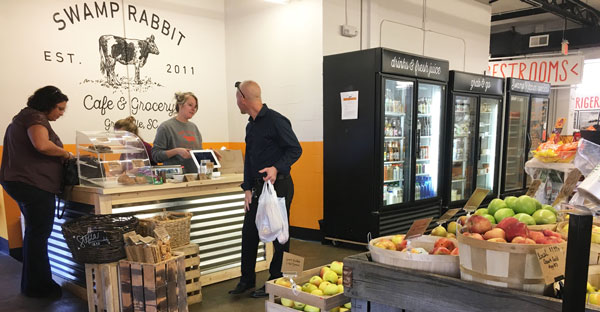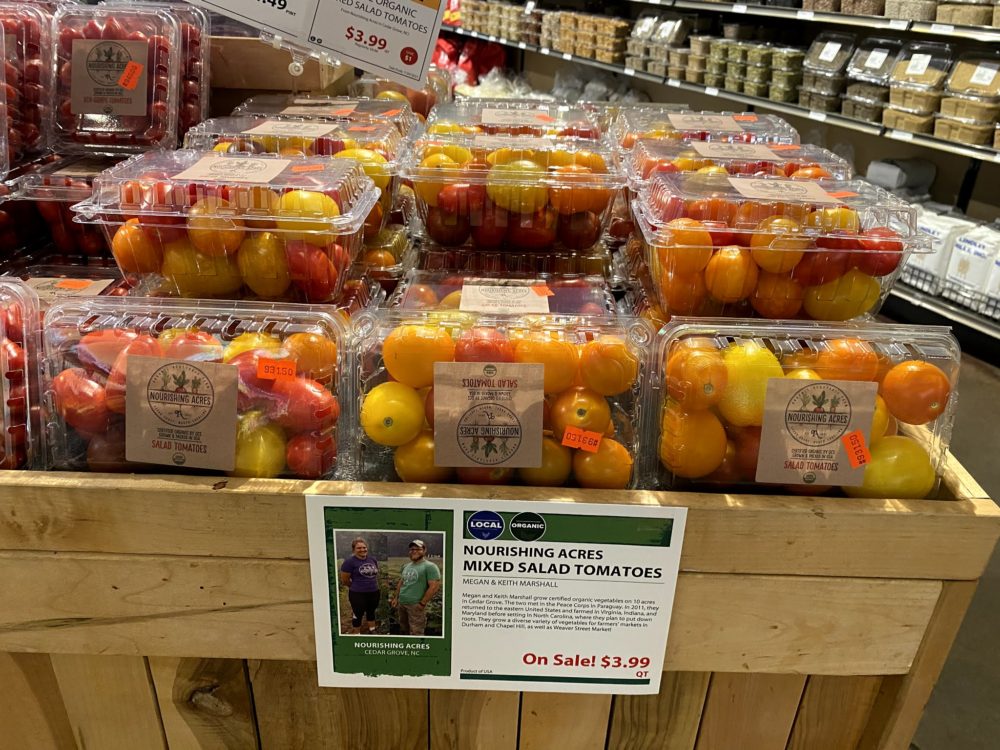by Geoff Seelen, CFSA Market Access Coordinator | Wednesday, Jul. 14, 2021 —
Starting a farm is one of the hardest things you will ever do. In addition to being responsible for producing many varieties of fruits and vegetables, you will need business acumen to market and sell your products successfully. Deciding where to sell is as important as deciding what to sell.
Farmers Markets and Their Limitations
While farmers markets are foundational to local food movements, they can be difficult for fledgling farmers to access. Theoretically, competition allows the best products to succeed, but commerce does not occur in a vacuum. Many established farms have long-standing relationships with patrons, making it harder for new farmers to stand out.
The farmers-market model impels vendors to cultivate multiple crops meaning the more variety you grow, the thinner you stretch your resources. These pressures eventuate the need for specialized equipment, complex planting and harvesting schedules, and more storage.
That said, the farmers market is an excellent place for gregarious, passionate, and knowledgeable farmers. If you enjoy interacting with customers, adding weekly trips to at least one market may be a good fit.
Before you commit the time and energy to apply for a stall at a local farmers market, do your research. Find out who their vendors are and what they are good at so you can create a competitive presence.
CSA: The Customer Is Always Right
At some point, farmers realized they could generate better cash flow by enticing consumers to buy into a weekly fresh produce subscription. By designating a dedicated drop-off point or, even better, having the customer come to the farm itself, farmers were able to cut costs. Another way CSA cuts costs is through the elimination of travel between markets for the farmer. With these savings, a CSA program can generate a valuable influx of capital at the beginning of the season when it is most needed. Having extra money allows farmers to invest in equipment, higher-quality seeds, much-delayed repairs, and labor with tight margins.
CSA requires business savvy and marketing to attract and retain loyal subscribers. Crop failures or shortages must be planned for and mitigated, as you stand to upset many people if you default on any portion of their promised produce. You will also need to be prepared to provide routine and timely customer service. Since you will be dealing with peoples’ expectations, you need to prepare for special requests and untimely refunds.

Inside Swamp Rabbit Cafe in Greenville, South Carolina
Wholesale Markets: Less Is More
While the CSA and farmers-market models require crop diversity and considerable customer service, wholesale markets offer an alternative. In exchange for sales at rates below the retail value, they will purchase much higher quantities at more regular intervals. By moving more volume to make up for the drop in price point, you make fewer trips. Your labor is confined to driving and completing a few drop-offs, so each sale takes less effort.
To enter the wholesale arena, you may have to update your practices. Many wholesalers dealing with local farms will favor those with GAP (Good Agricultural Practices) certification. Not all wholesalers require farms to carry this certification, so make sure to find out when pursuing your preferred customer.
Consistency and timing are essential when dealing with wholesalers. If you’ve promised 15lbs of spinach two times per week, it will reflect poorly on you if you don’t deliver. Additional requirements include the need to create more sophisticated packaging to compete in a highly commercial context. Because your product will be on the shelf next to fruits and vegetables from more established farms, it will benefit you to stand out.
Be proactive when dealing with wholesalers to determine the demand for the products you’d like to grow by forming a planting/harvesting consensus. If you like a freer hand when deciding what to grow, this may not be the right market. If instead, you want to develop a portion of your business that is easier to predict and manage, wholesalers limit the need to juggle many products at once.

FarmsSHARE food boxes at Freshlist in Charlotte, North Carolina
Food Hubs: The Future of Local Food Distribution?
Food hubs are a distinct class of wholesale distributors, in that their mission is to respond to the unique challenges facing local, sustainable, and, in some cases, inexperienced growers. These organizations seek to bridge the distribution gap between hyperlocal farmers markets/CSA and the broad reach of wholesalers. In many cases, they provide valuable infrastructure for storage and distribution, obviating the need for substantial capital investment.
Additionally, they serve to mitigate a blindspot in the food supply chain, creating collaborative local and regional food corridors. They can often purchase in smaller quantities, enabling farmers to enter the wholesale market below the threshold volume customarily needed to make their product attractive to larger buyers. Creating a single point of sale for produce takes the burden of marketing off the farmers themselves; once they drop it off at the hub, they don’t have to worry about getting the product to the consumer.
While they are motivated by a similar purpose, they’re not all identical. Some have created virtual farmers markets facilitated through an online purchasing platform; others help aggregate produce sales from rural Carolina farms. Having a single entity accept the responsibility of transportation and distribution makes the lives of small rural farmers much more manageable. Hubs in urban centers can harness their city’s restaurant scene, eliminating the need for farms and restaurants to work one-on-one.
An effort has been made in both North and South Carolina to form a network of food hubs. The corridors created through this process enable the sourcing of local products not suited for production in a particular region. It is now easier to ensure a local food supply chain emphasizing produce from small, sustainable, and historically underserved farms.
Conclusion
When considering these possibilities, it’s recommended to develop a diverse portfolio consisting of sales in multiple spaces. Risk management is key to any successful business, and supplying buyers in various markets can prevent catastrophe if one experiences disruptions or failure.
If you are interested in finding out more about how to select the appropriate market for your business, consider applying for CFSA’s market access services. We can supply the direct technical assistance needed to navigate the available markets in the Carolinas. This consultation service is free for members.



